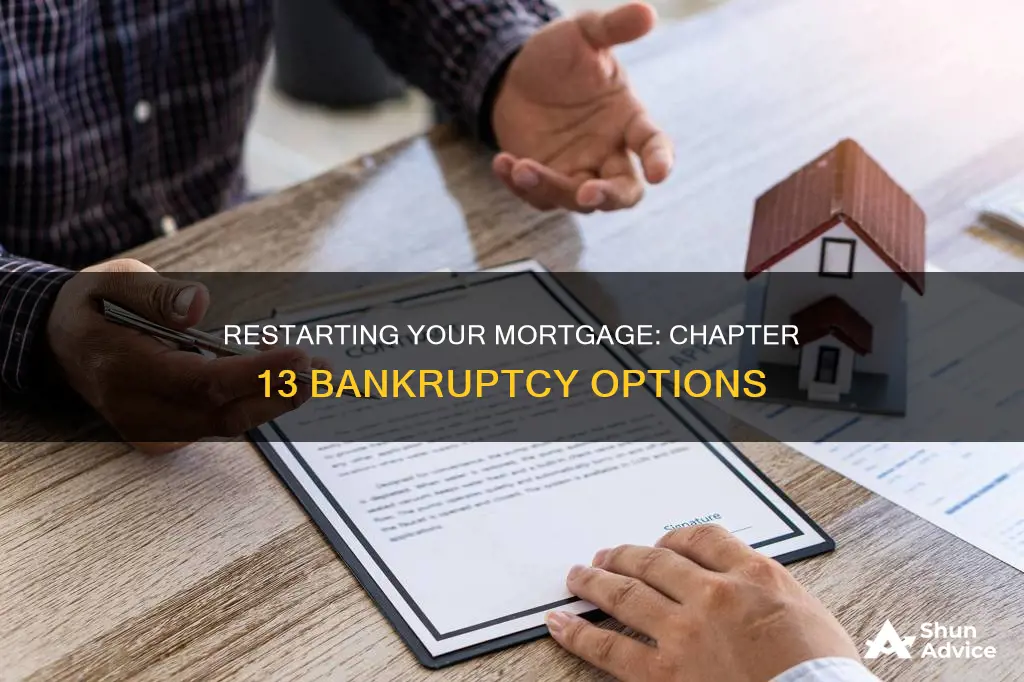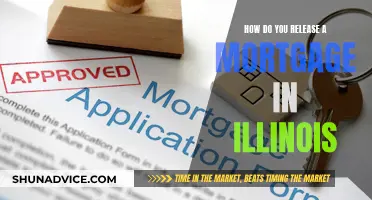
Chapter 13 bankruptcy is a valuable tool for those facing foreclosure and wanting to keep their homes. It allows individuals to retain their property and make up mortgage arrears through a structured repayment plan. This process can take between three to five years, during which individuals must remain current with their monthly mortgage payments and catch up on any overdue charges. Chapter 13 also provides the opportunity to strip junior mortgages and liens, reducing overall home loan debt. While it is possible to qualify for a new mortgage during Chapter 13, it requires careful planning, a strong credit score, and meeting specific requirements, such as 12 consecutive months of on-time payments. Overall, Chapter 13 offers a pathway for individuals to restart their mortgages, providing protection from foreclosure and a chance to regain financial stability.
| Characteristics | Values |
|---|---|
| Property loss | For the most part, you don't give up any property in Chapter 13 bankruptcy. This means that if you are current on your mortgage, you keep your home. |
| Foreclosure | Filing a Chapter 13 petition will pause any foreclosure proceedings that are in progress for your home. |
| Mortgage arrears | You must pay back all mortgage arrears by the end of the repayment period. You will have three to five years to make up overdue payments. |
| Mortgage payments | Many Chapter 13 filers will pay mortgage lenders directly. However, sometimes the bankruptcy court and Chapter 13 trustee require you to make your mortgage payments through your Chapter 13 plan. |
| Mortgage modification | You might try working with your lender for a mortgage modification after you start your Chapter 13 payments. |
| Mortgage debt | Chapter 13 bankruptcy provides tools to reduce your home mortgage debt. You can strip off junior liens (second or third mortgages or home equity lines of credit) in certain situations. |
| Mortgage approval | It is possible to qualify for a mortgage while going through a Chapter 13 bankruptcy with FHA or VA loans. |
What You'll Learn

Foreclosure proceedings
During the Chapter 13 repayment period, you must remain current with your monthly mortgage payments. You will also need to make up for any overdue charges or arrears that you accumulated before filing for bankruptcy. This can be done over three to five years, making the process more manageable. However, if you fall behind on your mortgage payments during this period, the bankruptcy court can lift the automatic stay, and foreclosure proceedings may resume. Therefore, it is crucial to stay diligent with your payments.
The Chapter 13 plan will also allow you to address any junior mortgages. If your house is worth less than what you owe on your first mortgage, you may be able to remove or "strip" these junior mortgages through the bankruptcy process. This is a valuable benefit of Chapter 13 that is not available in Chapter 7. Additionally, you may be able to work with your lender for a mortgage modification, but this will require approval from the bankruptcy judge.
In summary, Chapter 13 bankruptcy provides a temporary reprieve from foreclosure proceedings, giving you time to get your finances in order. It is important to remember that you must remain current with your mortgage payments and address any arrears to successfully retain your home during and after the bankruptcy process.
Car Finance and Your Mortgage: What You Need to Know
You may want to see also

Bankruptcy repayment plans
Chapter 13 bankruptcy, also known as a wage earner's plan, allows individuals with a regular income to create a plan to repay all or part of their debts. This is a customised debt management program based on personal debt and income. Debtors propose a repayment plan to make instalments to creditors over three to five years.
During this time, creditors are forbidden from starting or continuing collection efforts. The debtor must also pay back all mortgage arrears by the end of the repayment period, but this can be spread over three to five years. If the debtor falls behind on mortgage payments, the bankruptcy court may require them to make these payments through their Chapter 13 plan, which can be expensive as the trustee receives a percentage of the amounts paid to creditors each month.
In some cases, a debtor may be able to modify their mortgage to lower their payments, but this requires approval from the bankruptcy judge. Chapter 13 can also be used to remove or "strip" junior mortgages if the house is worth less than the amount owed on the first mortgage.
To initiate a Chapter 13 case, debtors must file a petition with the bankruptcy court in their area, along with schedules of assets and liabilities, income and expenditures, executory contracts, unexpired leases, and a statement of financial affairs. Consulting with an attorney is recommended to determine the best course of action and ensure all necessary steps are taken.
Mortgage Brokers: Verifying License Numbers and Legitimacy
You may want to see also

Mortgage arrears
If you're facing mortgage arrears, Chapter 13 bankruptcy can provide a way to get your account current again and prevent foreclosure on your property. During the Chapter 13 repayment period, you must stay on top of your ongoing mortgage payments, but you also need to catch up on any overdue charges from before you filed for bankruptcy. This can be done by paying the trustee, who will then pay your creditors.
The benefit of Chapter 13 bankruptcy is that you'll have more time to make up overdue payments, typically between three to five years. This is a key reason why people facing foreclosure often choose Chapter 13 over Chapter 7 bankruptcy. While it can be expensive to catch up on missed payments, it's important to note that failing to do so could result in losing your home.
Additionally, Chapter 13 bankruptcy can help lower your monthly mortgage payments. You can work with your lender to modify your mortgage, and if they approve, you'll need to get approval from a bankruptcy judge. Chapter 13 also allows you to remove or "strip" junior mortgages if your house is worth less than the amount you owe on your first mortgage.
It's crucial to remember that even during Chapter 13 bankruptcy, making timely mortgage payments is essential to keeping your home. Late payments on your Chapter 13 plan or mortgage can lead to fees or fines, and failure to pay these could result in losing your home. Therefore, staying current on your mortgage and repayment plan is of utmost importance.
Splitting a Mortgage: Navigating the Complexities of Shared Homeownership
You may want to see also

Mortgage modification
Chapter 13 bankruptcy can help you modify your mortgage and keep your house. It can stop a foreclosure and give you time to work out a modification with your lender. You can propose a repayment plan, and if the court approves it, you'll make monthly payments over three to five years. This feature of Chapter 13 is why many people facing foreclosure choose it over Chapter 7 bankruptcy.
During your Chapter 13 repayment, you must stay on top of your mortgage payments and catch up on any overdue charges from before you filed for bankruptcy. You can also work with your lender to modify your mortgage. This involves asking the lender to change the terms of the loan. For example, your interest rate could be adjusted, reducing your monthly payment, or your missed payments could be added to the end of your mortgage, increasing its length.
If you and your lender agree on a modification, the judge in the Chapter 13 case must review and approve the agreement. Most judges will approve the plan if the new terms are reasonable. Once the modification is approved, you'll propose a new Chapter 13 payment plan that removes the mortgage arrears and any other debt included in the new mortgage, such as past-due property taxes.
To modify your mortgage during Chapter 13 bankruptcy, you may need to participate in a Mortgage Modification Mediation Program. This program helps debtors and lenders work together to find a solution. The debtor must pay a mediation fee of $200 and attend the mediation session. The lender will also pay $200 to the mediator and participate in the mediation sessions by telephone or video conference. The mediation must be completed within 75 days of the appointment of the mediator.
Renegotiating Your Mortgage: Strategies for Success
You may want to see also

Bankruptcy mortgage qualification
Bankruptcy can affect your ability to qualify for a mortgage, but it doesn't completely disqualify you from ever getting one. The impact of bankruptcy on mortgage qualification depends on the type of bankruptcy and the time that has passed since its discharge.
Chapter 13 bankruptcy, for example, allows individuals to keep their real estate property and non-exempt assets. This type of bankruptcy is for those with a regular income who want to reorganise a payment plan to repay their debts. It gives homeowners facing foreclosure a chance to pause the proceedings and catch up on overdue payments within three to five years. While Chapter 13 bankruptcy can help prevent losing your home, it also requires staying on top of monthly mortgage payments during the repayment period.
Qualifying for a mortgage after bankruptcy can be challenging due to the negative impact on your credit score and credit report. The fact of bankruptcy is recorded and remains on your credit report for seven to ten years. This means that lenders will be aware of your bankruptcy history when they run a credit check. However, the waiting periods for qualifying for a mortgage after bankruptcy vary depending on the type of loan and bankruptcy.
For a conventional (non-government) mortgage, you typically need to wait four years after a Chapter 7 bankruptcy discharge or Chapter 13 dismissal. In contrast, a two-year waiting period is required after a Chapter 13 bankruptcy discharge. FHA loans, insured by the Federal Housing Administration, offer more lenient guidelines for borrowers with low credit scores. After the waiting period, borrowers with bankruptcies must demonstrate improved credit management. Similarly, VA and USDA loans have specific eligibility requirements, such as income limits and fixed-rate terms, respectively.
While it may be difficult to obtain a standard mortgage immediately after bankruptcy, non-qualified (non-QM) mortgage programs may provide an option for those who can afford the high-interest rates and large down payments typically associated with these loans. These non-QM loans are designed for borrowers who don't meet traditional mortgage criteria and don't mandate a post-bankruptcy waiting period.
Understanding Mortgages: How Do They Work and Why?
You may want to see also
Frequently asked questions
Chapter 13 bankruptcy is a legal process that allows individuals to create a repayment plan for their debts, without giving up their property. This can be used to avoid foreclosure and make up mortgage arrears.
Chapter 13 bankruptcy can be used to reduce your home mortgage debt. It can remove or 'strip' junior mortgages and liens if your house is worth less than the amount you owe on your first mortgage. You can also work with your lender to modify your mortgage.
Yes, for the most part, you do not give up any property when filing for Chapter 13 bankruptcy. This means that if you are current on your mortgage, you can keep your home. However, you must stay on top of your mortgage payments and catch up on any arrears.
It is possible to get a mortgage during Chapter 13 bankruptcy, but it requires careful planning and guidance. You may qualify for an FHA or VA loan during Chapter 13 if you have 12 consecutive months of on-time payments and receive court approval.







